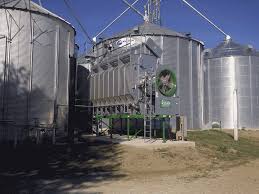As world leaders were scrambling for answers last week in Rome at a United Nations summit on the global food crisis, agribusiness leader Martin Taylor was quietly stepping to the podium before 40 farm industry leaders and media in Guelph to suggest his solution to the problem — current technology.
On Monday, Taylor, chair of the board of directors for Basel, Switzerland-based Syngenta AG, stopped in Guelph — where the company makes its Canadian headquarters — as part of his first visit to Canada as company chair. The Canadian group, led by president Jay Bradshaw, invited key influencers to meet him, pick his brain and see what the head of one of the world's most influential and globally minded agricultural companies is thinking.
One thing on his mind — which is not unlike other companies — is the bottom line.
Syngenta has a lot to gain if technology takes on an increasing role in addressing food problems. It already has a major stake in the situation, having realized sales of $9.2 billion last year, followed by a 20 per cent increase in the first quarter of 2008.
Syngenta is immersed in technology, through its development of crop protection products and seed technology, including genetically modified seed.
That's created some perception and acceptance problems at home and abroad, mainly by self-interest groups, not farmers. But despite the big numbers, Syngenta's been much less of a target than other multinationals, perhaps because of its commitment to education and development and a less aggressive approach to agribusiness.
Taylor exemplifies the Syngenta philosophy. He showed up for the Guelph dinner meeting in a cardigan, tie and slacks, rather than a three-piece suit. He’s soft-spoken and polite. He answered questions thoughtfully and directly. He appeared more interested in learning about Canadian agriculture than he did in selling another bag of seed.
But his mood darkens when he talks about how technology has taken a back seat to simplified, single-objective approaches to food production, particularly in regards to feeding an increasingly needy world. The technology exists to solve the problem, he says, but he’s frustrated that what he calls “medieval” approaches to food production – mostly, small-scale agriculture.
According to Taylor, intensive agriculture is vital for feeding a growing, environmentally sensitive planet. He told me in an interview before the meeting he believes responsible intensive farming is good for the environment because it allows land to be used more efficiently, coaxing more yield out of the same acreage. We’ve seen that in Ontario – Gord Surgeoner, president of Guelph-based Ontario Agri-Food Technologies, regularly makes presentations about how much production has increased in this province while available land has reminded static, or shrunk.
But Taylor goes one step further with his global view.
"The world has to choose between technology, deforestation and hunger," he says.
And he thinks Canada has a pivotal role in helping address world hunger. When it comes to grain, we produce much more than we can use, so we always have an exportable surplus. We’re known as a research- and technology friendly country, open to ways we can increase yields. Among major exporting nations and those that have the potential to increase their contributions, such as Ukraine, Russia and South America, we are the most stable. Taylor calls us a “bastion of rationality and science.”
That means we’re a great country in which to invest. Summit leaders are drawing up what they call emergency plans to address the global food situation. It is indeed complex, but at its base, it needs to involve more dialogue, more farmers and more food. That means more research and better use of technology. U.S. Agriculture Secretary Ed Schafer has already chimed in, saying there’s “no way” the world can meet a target of boosting food production by 50 per cent by 2030 without more genetically modified food production.
So, Canada, what’s the plan?


